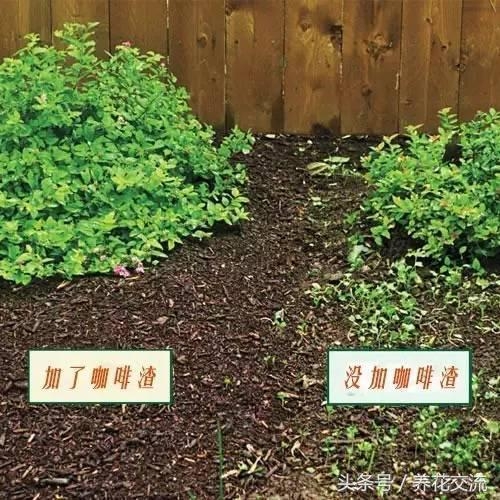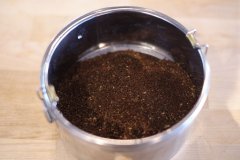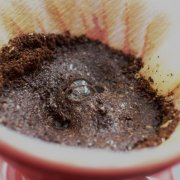The four benefits of growing coffee grounds teach you how to lead Starbucks coffee grounds.

Professional coffee knowledge exchange more coffee bean information please follow the coffee workshop (Wechat official account cafe_style)
Taiwan's high-quality textile coffee grounds can also change into clothes.
Coffee grounds are the dregs produced after coffee beans are ground and steamed. They are usually treated as waste. It's nice to ask your boss for some when you drink coffee, or if you have someone at home drinking coffee, you can usually store it. Let's take a look at the complete method used.
As can be seen from the above picture, different plants on both sides use rotten coffee grounds and useless, the difference is quite big, of course, the use of coffee grounds does promote plants, mature coffee grounds will not reduce the pH value of the soil, see how to use it.
1. Introduction of coffee grounds content:
Coffee grounds contain about 2% nitrogen, but can not be directly thrown into the soil, but after ripening and decomposition, it can be put into the soil, and it is a long-term fertilizer that will not show its effect all at once.
Coffee grounds also contain other trace elements and nutrients, such as phosphorus and potassium, as well as potassium, magnesium and copper.
Coffee grounds also contain calcium, manganese, zinc and iron, but these nutrients are too low to have much effect on plant growth.
2. Will the use of coffee grounds make the soil alkaline?
Many people say that coffee grounds will make the soil alkaline, which is misused. After three months of sealed fermentation, coffee grounds are slightly acidic or neutral after ripening, and will not make the soil alkaline. If you leave it directly in the soil without fermentation, it will decompose and heat in the soil and burn the roots.
Long-term use of coffee grounds can improve soil fertility and structure, increase organic components in the soil, promote seed germination and seedling growth, and prevent various bacterial infections, such as Fusarium wilt.
3. Coffee grounds compost
If you want to compost coffee grounds, you can mix them directly into the garden soil, or even put them in with other vegetable leaves and peels. The content of coffee grounds can be controlled within the range of 20% and 25%. This is beneficial to maximize the role of coffee grounds and should not be overused. Other composting substances are a mixture of hay, fallen leaves and vegetable leaves.
4. Coffee grounds cover
Coffee grounds for the four major functions of flower cultivation, teach you free self-made flower fertilizer
Of course, coffee grounds can also be used as a medium for the pavement, because it is directly used, it can not be directly in contact with the root system of the plant, should be placed around the plant.
Put coffee grounds in a circle on the edge of the basin soil, snails and slugs will not invade your plants, but also can prevent weeds, conducive to soil ventilation.
The advantage of coffee grounds is that it can keep the soil moisture, and it is reasonable to keep warm by covering some coffee grounds next to plants in winter to prevent frostbite.
Tips:
If you find that there are very few coffee grounds made by yourself, you can ask a nearby coffee shop and they will be happy to provide you with these "fertilizers".
.
Important Notice :
前街咖啡 FrontStreet Coffee has moved to new addredd:
FrontStreet Coffee Address: 315,Donghua East Road,GuangZhou
Tel:020 38364473
- Prev

Don't you know that Starbucks coffee grounds are free? Why don't you get some coffee grounds to grow flowers and prevent insects?
Professional coffee knowledge exchange more coffee bean information Please pay attention to the coffee workshop (Wechat official account cafe_style) Taiwan's high-quality textile coffee grounds can also be changed into clothes the characteristic cafes and convenience stores on the streets are wafting the aroma of coffee at any time, coffee has become a very popular national drink. However, accompanied by a large number of coffee grounds, how to deal with it? And let the experts and talents
- Next

Can I eat coffee grounds? Can I lose weight by eating coffee grounds? Why do cockroaches like coffee grounds so much?
Professional coffee knowledge exchange more coffee bean information please follow the coffee workshop (Wechat official account cafe_style) Taiwan's high-quality textiles coffee grounds can also change clothes have seen on the Internet that coffee can be used as an insect repellent? Cockroaches don't like it? Can caffeine kill Xiaoqiang? Usually use filter paper to make coffee by hand, and put used filter paper and coffee grounds cooled after brewing in the refrigerator at night.
Related
- Workers collapse! Lucky suspects that it will introduce freshly cut fruits?!
- 1-point subsidy recipients wear thousand-yuan watches?! Local response: For low-income households
- Can lightly roasted coffee beans be used to extract espresso? How finely should you grind high-quality coffee beans to make Italian latte?
- What is the difference between the world's top rose summer coffee and Yejia Shefi? What are the flavor characteristics of Yega Shefi coffee and Panama rose summer?
- The ceremony is full! Starbucks starts to cut the ribbon at a complimentary coffee station?!
- A whole Michelin meal?! Lucky launches the new "Small Butter Apple Crispy Latte"
- Three tips for adjusting espresso on rainy days! Quickly find the right water temperature, powder, and grinding ratio for espresso!
- How much hot water does it take to brew hanging ear coffee? How does it taste best? Can hot water from the water dispenser be used to make ear drip coffee?
- What grade does Jamaica Blue Mountain No. 1 coffee belong to and how to drink it better? What is the highest grade of Blue Mountain coffee for coffee aristocrats?
- What are the flavor characteristics of the world-famous coffee Blue Mountain No. 1 Golden Mantelin? What are the characteristics of deep-roasted bitter coffee?

